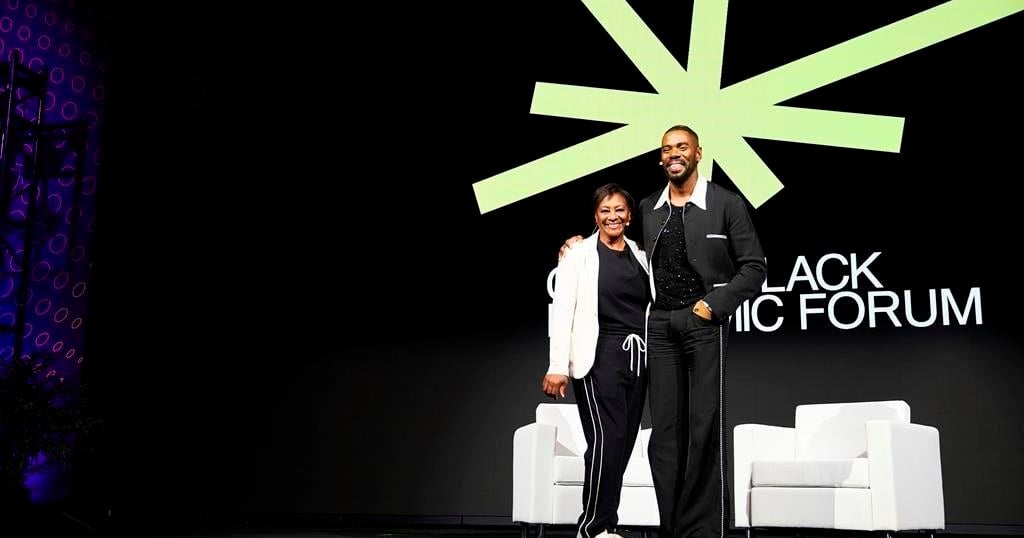NEW YORK (AP) — Colman Domingo has implicitly invited audiences to take the journey of racial healing throughout his career.
The Afro-Latino actor’s portrayals often complicate popular representations of Black masculinity. There’s his Oscar-nominated Bayard Rustin, the unsung gay civil rights leader. Or Mister, the abusive antagonist of “The Color Purple” who sheds his misogyny in a last bid at redemption. His most recent film, “Sing Sing,” follows the wrongly incarcerated leader of a prison theater troupe.
Now enjoying the hard-earned spotlight for those leading performances and his fashion-forward looks, Domingo is thinking more intentionally about his off-screen platform. And that call for racial healing has grown more explicit through a new partnership with the W.K. Kellogg Foundation.
The children’s opportunity nonprofit has long centered antiracism, according to president La June Montgomery Tabron. To help all youth thrive, she said, it’s necessary to address root causes like racial inequity.
In 2017, the W.K. Kellogg Foundation promoted the first National Day of Racial Healing, which is now recognized annually after Martin Luther King Jr. Day.
Kellogg leaders hope a “storyteller” like Domingo can encourage year-round racial healing, which the foundation describes as “the practice of reflecting on personal experiences, confronting past wrongs and present consequences, and cultivating trustful relationships.”
“When we look at Colman and his work around just lifting up all of humanity and creating an empathetic response to stories, that’s exactly what the core of racial equity and racial healing is all about,” Tabron told The Associated Press.
Domingo recently discussed the collaboration and “Sing Sing” with AP. This conversation has been edited for clarity and length.
————————
Q: Why are you using your platform to further this cause?
A: The more my platform has widened, I thought, “What do you give voice to?” I want to put my voice behind things that are important to me, especially this National Day of Racial Healing.
This is how I become a bit more human. This is how we extend a bit more grace to one another. This is the way that we can actually do the work of healing: to not be angry, to not be polarized, but to find more love and more grace and more dignity in each other’s stories, in each other’s backgrounds, and get to know each other a bit more.
———
Q: In “Sing Sing,” your character tells a new actor “anger is the easiest thing to play,” but “what’s more complicated is to play hurt.” How do you bring that lesson into the process of racial healing?
A: That’s something I learned as an actor and I’ve really put that into my life — to really acknowledge the more complex feelings. Anger is the easiest thing to feel. It only goes one way, really. You can’t really heal from it and find other notes. Something I know that I find useful in my life is to acknowledge every feeling I feel. The quickest thing to feel is anger, but it doesn’t help you grow. All the other complex emotions help you grow.
——-
Q: How have the arts influenced your own journey of racial healing?
A: It’s given me a voice, actually — given me more of my place in the world. I also have work that helps me delve into history, so I have an idea of my identity and who I am and who other people are. I constantly have a curiosity in the world and its people, and I think has made me a bit fuller of a whole human being.
I do that daily with my work, which is such a blessing. I know many people don’t, but they can find tools to do that with dayofracialhealing.org.
———
Q: The short bursts of joy in “Sing Sing” are so memorable: a rehearsal dance circle, a post-audition pirouette. How do you find joy during this healing process when racism can feel so heavy?
A: The pirouette was a very conscious decision to show who this Black man is on the inside that the world may not see. To see a bit more complexity and tenderness and really deconstruct their ideas of who this Black man is — and who this Black man who is incarcerated is. No one would ever imagine that this man had a dancer inside of him.
For me, that does the work of racial healing. You can see a Black and brown man differently. That’s the work that is happening on a very subtle basis when people experience our film. They see Black and brown men being tender with each other, laughing with each other. Even Black men, we know what’s possible when we’re allowed to be free and be full in our experience.
___
Associated Press coverage of philanthropy and nonprofits receives support through the AP’s collaboration with The Conversation US, with funding from Lilly Endowment Inc. The AP is solely responsible for this content. For all of AP’s philanthropy coverage, visit https://apnews.com/hub/philanthropy.
